Lawrence (Felt): The 13th Floor Interview
Begun by a teenager known only as Lawrence who was obsessed with Tom Verlaine of Television, Felt emerged at the end of the 1970s.
The London-based band, led by Lawrence and supported by a revolving lineup of musicians, released 10 albums and 10 singles during the 1980s, then promptly disbanded, mission accomplished.
Now, the enigmatic Lawrence…his surname remains a mystery…has revisited the Felt catalogue…remastering, and in some cases, remixing, and reissuing all 10 albums and singles.
The 13th Floor’s Marty Duda tracked Lawrence down and talked to him about his reasons for reissuing the music of Felt. In doing so, he discovered a man who considers himself a true artist, one that continues creating today with his latest band, Go-Kart Mozart.
Click here to listen to the interview with Felt’s Lawrence:
Or, read a transcription of the interview here:
MD: How involved were you in the actual re-issue process? Do you get your hands dirty, working on the re-masters, or did you just give your blessing, and let someone else do the dirty work?
L: No, I did everything. It’s all my project.
MD: It is? Oh, fantastic!
L: Oh, yeah. We tracked down as many master tapes, and production masters, as possible. Then I went to a mastering room. I did the artwork in conjunction with designers. I was there the whole process.
MD: What made you decide that this was the time for these albums and singles to be re-issued?
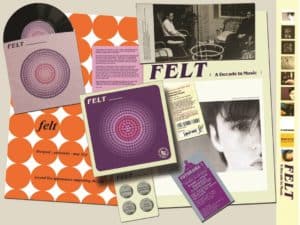 L: The project was started quite a while ago – maybe five years ago – so, it was decided a long time ago, and it’s just taken this long to get it together. I think they were never perfect for me, personally. I’ve always wanted to get the whole catalogue released as one, so that I can look at it properly, see it how I wanted to see it. So I’ve always wanted to do that, and it just came about in the last five years. I don’t know why it happened right then. It’s so long ago, I can’t think of the “reason that actually spurred it.
L: The project was started quite a while ago – maybe five years ago – so, it was decided a long time ago, and it’s just taken this long to get it together. I think they were never perfect for me, personally. I’ve always wanted to get the whole catalogue released as one, so that I can look at it properly, see it how I wanted to see it. So I’ve always wanted to do that, and it just came about in the last five years. I don’t know why it happened right then. It’s so long ago, I can’t think of the “reason that actually spurred it.
MD: Why did the process take so long? Why is it a five year proposition?
L: Because we were tracking down the tapes. The artwork took a long, long time, because… for example, one of the photos took months and months to track down – it was a photo of the original guitarist – and that, in itself, took over a year, just to get this photograph… from the original photographer.
It was a remarkable process, and it was enlightening, and it was great to finally hear the songs as I imagined them in my head for all these years.
MD: Sound wise: will people, who are familiar with the original pressings of the record back in the ‘80s, notice a difference in what these re-issues sound like compared to the originals?
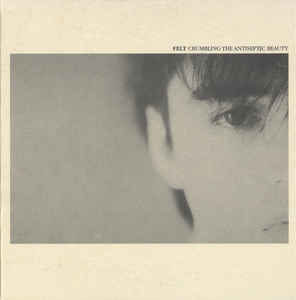 L: I think, in the early days – in the early ‘80s especially – the vinyl wasn’t very good, at all, compared to today. I think the independent labels would use some kind of… left over vinyl, or something… it’s very crackly. In that respect, the vinyl is so much better, and the CD is better because of the modern technology that we’ve got. Also, I’ve remixed one of the albums – the fourth album. It was produced by Robin Guthrie from the Cocteau Twins, and I was never happy with the production on that record – on most of the tracks – so, I remixed the six vocal tracks. It’s kind of half instrumental, half vocal, the album… and the vocal tracks: I’ve remixed them; so, that took ages as well.
L: I think, in the early days – in the early ‘80s especially – the vinyl wasn’t very good, at all, compared to today. I think the independent labels would use some kind of… left over vinyl, or something… it’s very crackly. In that respect, the vinyl is so much better, and the CD is better because of the modern technology that we’ve got. Also, I’ve remixed one of the albums – the fourth album. It was produced by Robin Guthrie from the Cocteau Twins, and I was never happy with the production on that record – on most of the tracks – so, I remixed the six vocal tracks. It’s kind of half instrumental, half vocal, the album… and the vocal tracks: I’ve remixed them; so, that took ages as well.
MD: What was it like, for you personally, to go back into those tracks, and re-involve yourself in the creative process, again, with music that’s thirty, forty years old?
L: It was incredible, really, to hear the master tape, because I didn’t know what tracks we were going to get, because lots of it was recorded with a effects on it; so, I didn’t know whether I was going to be able to remix these tracks, but, luckily, there were lots of different takes, and some of them were recorded when the instruments were dry. For example: there were two drum kits. One of them was dry, one of them was covered in reverb effects. I didn’t really know what I was going to get when I booked the studio, and went down and listened to these masters. It was an incredible process. I mean, first of all, we had to bake the tapes in an oven – not a conventional oven, but a special oven that people use nowadays.
It would have been lovely to have had a band of brothers…but nobody showed as much commitment as me. I’m like an artist; they’re musicians; that’s the difference.
MD: It keeps the ferric oxide on the actual tape. Is that right?
L: Exactly, yes. So, you do that, then the tracks are downloaded onto a hard drive, and then you work from the hard drive. It was a remarkable process, and it was enlightening, and it was great to finally hear the songs as I imagined them in my head for all these years. There are six tracks, that I’ve remixed, on album number four.
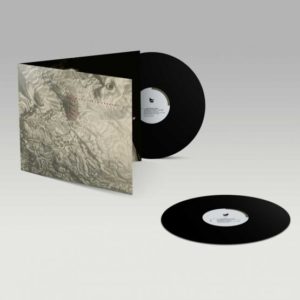 MD: Is that Ignite the Seven Cannons?
MD: Is that Ignite the Seven Cannons?
L: That’s right, yes.
MD: So, right there, is a reason to check them out. Even long term fans will hear something that they haven’t heard before, then, I guess.
L: Exactly. That was one album that fans never talked about with me. They would say, “I loved Primitive Painters, as a track,” but they never talked about any other song on that record, and I know why: because the other songs are covered in effects, and you couldn’t really hear the tune, or anything. It was all submerged in a kind of reverb and delays and all these ‘80s effects that Robin Guthrie used on The Cocteau Twins, which sounded fantastic on his own band – his records sounded beautiful – but using the same process on Felt was a big mistake.
MD: Did you have any conversations, or work with any of the other band members? Martin Duffy was just in town with Primal Scream this past weekend; so, I was wondering if any of those folks were involved in this project as well.
L: No, none of them; not at all. Felt is my band; it’s my project…. It’s not a solo project, but the band members: they’re not involved at all. They did their job at the time, and then they went home straight away. They were never involved in the mixing of the record; not at all. They played live with me, but you can see, from the albums, how many different people were there. They just came and went. They weren’t that interested in the group, to be honest. It was totally, a hundred percent, my project, really.
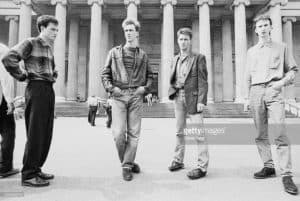 MD: Would you have preferred to have somebody, or a couple of people, that were as dedicated as you were, to the band, or was it preferable that you were able to remain in control of things?
MD: Would you have preferred to have somebody, or a couple of people, that were as dedicated as you were, to the band, or was it preferable that you were able to remain in control of things?
L: No! It would have been lovely to have had a band of brothers. That was my intention from the beginning, but nobody showed as much commitment as me. I’m like an artist; they’re musicians; that’s the difference.
MD: I see. It did start with you, just on your own, in 1979. The first single…you were solo: you did all the instruments.
I discovered the Velvet Underground: that was an amazing discovery for me, and, hopefully, Felt can astonish people in the same way.
L: Yeah, exactly, but I did, in 1980, try and form a band. I tried my hardest, and the original guitar player, Maurice Deebank – quite a genius, really – he just upped and left immediately; and, for five years, I was constantly dragging him back, and then he was leaving, and then I was dragging him back. It was a constant to-ing and fro-ing all the time.
MD: It must have been frustrating. Was it also a nostalgic project? Do you listen to this music very often, on your own, or is this the first time you’d really given it a hard listen since 1989?
L: No. It wasn’t like, “Wow! This is a shock,” apart from that one album that I remixed the six tracks, because I’ve constantly been listening to
Felt, over the years; not for pleasure, but kind of like a detective: seeing where I stand, now, compared to the past, and when I make a new record, I think of Felt; so, it’s always on the agenda with me. The best way to describe it is I’m like a detective.
MD: As a detective, what have you discovered?
L: Well, there’s not much to discover, because I’ve constantly been aware of the tracks and the way they sound, and hearing them; so, they were always in the back of my mind. It wasn’t as if, for example, I didn’t play the second album for twenty years… they’ve always been around.
MD: There’s going to be a lot of people – younger people – who, probably, weren’t even born in the ‘80s, who are going to be checking this stuff out. They’ll have heard of you – with the internet, and the way things are these days, it’s very easy for folks to find older bands that they may just hear about from one person or another. How would you describe to somebody who’s, say, twenty one years old now, what it was that you were doing with this band?
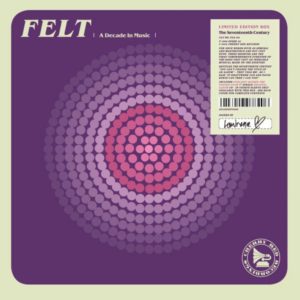 L: First of all, my intention is for young kids to get into Felt. This is one of the reasons for doing it: is for new generations of boys and girls to discover the band; to update the artworks, so that young kids can discover it and fall in love with the music. I don’t just want people of my generation to buy it, and to have fans who are all old men. That is not the intention at all. The intention is for teenagers, especially, to discover the band, and, hopefully, share it with their friends, or tell people, “I’ve discovered this incredible band from the ‘80s. You won’t believe it! This guy only wanted to make records in one decade, and he didn’t want to be part of any other decade but the one he was living in,” you know, all of these stories. There’s a great back story there for kids. Like, for example, similar to when I was young, and I discovered the Velvet Underground: that was an amazing discovery for me, and, hopefully, Felt can astonish people in the same way, I hope.
L: First of all, my intention is for young kids to get into Felt. This is one of the reasons for doing it: is for new generations of boys and girls to discover the band; to update the artworks, so that young kids can discover it and fall in love with the music. I don’t just want people of my generation to buy it, and to have fans who are all old men. That is not the intention at all. The intention is for teenagers, especially, to discover the band, and, hopefully, share it with their friends, or tell people, “I’ve discovered this incredible band from the ‘80s. You won’t believe it! This guy only wanted to make records in one decade, and he didn’t want to be part of any other decade but the one he was living in,” you know, all of these stories. There’s a great back story there for kids. Like, for example, similar to when I was young, and I discovered the Velvet Underground: that was an amazing discovery for me, and, hopefully, Felt can astonish people in the same way, I hope.
MD: Are there any contemporary bands, that you listen to, that you’re impressed with these days?
L: Yeah! Gosh! I love the new St. Vincent album. I love that album! Do you know that album?
I’m an artist. I’m like a painter. I’m like Picasso. That’s what I’m like. I just move forward all the time.
MD: I do, yeah! It’s pretty fantastic.
L: I love that one…. I just bought the Insecure Men record. Have you heard of that yet?
MD: That one I don’t know.
L: No, it’s just breaking in London. People are talking about it a lot. It’s the guy from Fat White Family.
MD: Oh, yeah!
L: Have you heard of that band?
MD: Yep, yep, yep!
L: It’s the guy from that band. It’s a new project. So, I try my hardest to listen to new projects, and to be aware of what’s going on; but, mainly, I listen to electronic music.
MD: Your project, Go-Kart Mozart, is still a happening thing.
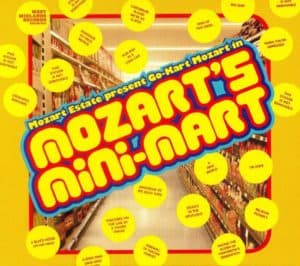 L: Oh, yeah! We had a new album out last week, and part of the whole process was to release a Go-Kart Mozart record on the same day as the Felt re-issues, so that people can see that this is a true artist here. This isn’t somebody reveling in the past and just coming out of hibernation to re-release the old records. I’ve been working on new stuff constantly – I always do – so, in conjunction with the old stuff, there’s a new album as well, which is called Mozart’s Mini-Mart. It’s all brand new songs – I think there’s seventeen on the album – and we started touring in Brighton last week – we did two dates: Brighton and London – and we were on the road, now, for one and half years.
L: Oh, yeah! We had a new album out last week, and part of the whole process was to release a Go-Kart Mozart record on the same day as the Felt re-issues, so that people can see that this is a true artist here. This isn’t somebody reveling in the past and just coming out of hibernation to re-release the old records. I’ve been working on new stuff constantly – I always do – so, in conjunction with the old stuff, there’s a new album as well, which is called Mozart’s Mini-Mart. It’s all brand new songs – I think there’s seventeen on the album – and we started touring in Brighton last week – we did two dates: Brighton and London – and we were on the road, now, for one and half years.
MD: Oh, okay! Are you coming to New Zealand?
L: Well, you know, you have to ask a promoter to book us. If you know any promoters that will book us, then we’ll come.
MD: Alright. That sounds like a plan. I know you’re reluctant to reform Felt, but you do perform Felt tunes, in your live set, with Go-Kart Mozart. Is that right?
I’ve really lived for my art. I mean, I’ve really suffered for my art, and there have been some terrible consequences because of it.
L: No, never.
MD: It’s not? Oh, okay!
L: No! Why would I do that? That wouldn’t make me an artist. That would make me a jobbing musician; and I’m not a jobbing musician. I’m an artist. I’m like a painter. I’m like Picasso. That’s what I’m like. I just move forward all the time.
MD: How would you compare the stuff that you’re doing now – the new music that you’re making – to what you were doing back in the ‘80s?
L: Oh, gosh! It’s very different on purpose, because I don’t want to repeat myself, if at all possible. The music that I’m doing at the moment is keyboard based, but that doesn’t mean, in the future, I won’t do something similar to Felt. It’s just, at the moment, I’m kind of obsessed with keyboards. It’s just the transitions we go through.
MD: Yeah. People love your guitar playing from Felt.
L: Yeah! I took a back seat from the guitar for quite a while, just to explore keyboards…. In the past, I could feel this reluctance to follow me on this journey into the future, but now, I think people have realised that Go-Kart Mozart is a really great band. The gigs we did last week were incredible, and I think people are finally coming around to this new band.
MD: Do you find that the legacy of Felt over shadows the new band, and it’s something that you have to get past?
I really want people to hear the music I did. I don’t want it to simply be found in second hand shops.
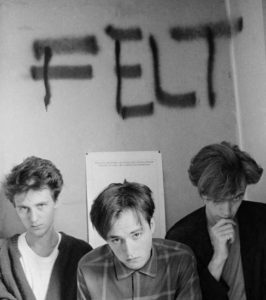 L: No, I don’t think it over shadows it. I think, in the past, there was a kind of sadness, because I wouldn’t play Felt songs, and I refused to reform the band, because people were so used to the bands of my generation reforming. They were so used to it, that they almost expected me to do it. I think now, they realise, “Okay. This guy isn’t going to be one of those people. He’s just not going to do it. Let’s embrace him now and check out what he’s doing now,” and I think they’ve come round. They can see the worth in trying to strive to be a better artist by not going back to the past all the time; because rock & roll musicians just constantly go back to the past.
L: No, I don’t think it over shadows it. I think, in the past, there was a kind of sadness, because I wouldn’t play Felt songs, and I refused to reform the band, because people were so used to the bands of my generation reforming. They were so used to it, that they almost expected me to do it. I think now, they realise, “Okay. This guy isn’t going to be one of those people. He’s just not going to do it. Let’s embrace him now and check out what he’s doing now,” and I think they’ve come round. They can see the worth in trying to strive to be a better artist by not going back to the past all the time; because rock & roll musicians just constantly go back to the past.
MD: They do. Yes, it’s true. It is very much the case these days. Well, I guess it’s because, possibly, rock & roll isn’t exactly the popular music…. It’s been over shadowed by a lot of other types of music in the last fifteen, twenty years; so, it’s, probably, easier for rock & rollers to rest on past laurels.
L: Yeah! You said it: it’s easy; and that’s the problem with musicians: they will go for the easy option. If the money’s running out, they think, “Gosh! What can I do now? Okay, reform the old band. Let’s get the old band back together, and then we can get some more money.” For me, I am not money based. It’s not about money. I’ve kind of been homeless on the street. I’ve really lived for my art. I mean, I’ve really suffered for my art, and there have been some terrible consequences because of it. I’m so different to that mindset of, “Let’s get some money. Let’s reform the old band.” I’m on a completely different level to those people.
L: So, I guess it’ll be pleasant surprise for folks, who know that that’s your attitude, to find that you’ve been so involved in these re-issues.
L: What I’m saying is: I love what I did. I’m not trying to hide from what I did. It’s part of my musical journey. I love it. I’m proud of it, but I don’t have to reform it and play it. The records are there as documents of the past, and I really want people to hear the music I did. I don’t want it to simply be found in second hand shops.
- Adam Hattaway & The HauntersJuly 25, 2024Wine Cellar (13th Floor Concert Review) - July 26, 2024
- New Music Friday: 13th Floor New Album Picks: July 26, 2024 - July 26, 2024
- Holly Arrowsmith – Blue Dreams(Leather Jacket Records) - July 25, 2024

April 7, 2018 @ 2:26 am
The way he goes to great lengths to stress how he believes that Felt was HIS project and HIS band and that he is an artist, whereas the others are mere musicians, he sounds deluded.
April 7, 2018 @ 7:55 am
Yeah,definitely, no offence to Lawrence, but Deebank and then Duffy were so important, they’re also the reason why Felt are such a revered band today.